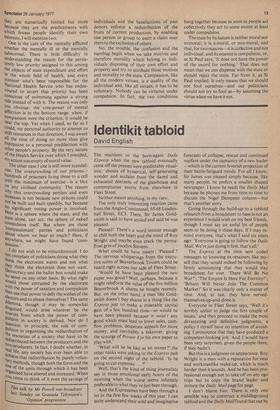The humbug of 'compassion'
Enoch Powell
If any one word in the dictionary of political jargon could make me sick, it would be the word 'compassion.' Parties and politicians vie with one another to claim to be actuated by 'compassion' when they raise state pensions or provide benefits for the handicapped, when they build old people's homes or equip hospitals. The word 'charity' having fallen into disrepute, its place in the vocabulary of humbug has been taken by 'compassion' or by that, if possible, still more odious equivalent, 'concern.'
The word 'compassion' is used correctly in the story of the Good Samaritan who 'had compassion' on the victim of a mugging. The proof of his compassion was that he was moved to do things for someone else at his own expense and even at his own risk : he lost his time, he spent his money, and—as likely as not—he endangered his skin. He did not even do it for the sake of winning good opinions: for there is no reason to suppose he ever dreamt that he would be immortalised in one of the gospels. That is 'compassion': to give of one's own without return, even the return of being known as compassionate. 'Let not thy right hand know what thy left hand doet h.'
There is none of this about state, welfare: neither the electors nor their elected representatives have any right to be considered 'compassionate.' The essence of state welfare is compulsion. If you question that, just try the experiment of withholding part of your rates or taxes on the ground that you don't happen to be feeling all that compassionate this year! The politicians in charge of the machine use the compulsion of the state to take people's money off them and give it to others either in cash or kind. They do so because they believe it will get them votes—they do it, in other words, for their own advantage. There would be precious few state welfare services if the provision of them was believed to be a net loser of votes at election time.
Nor are the electors actuated by compassion any more than the politicians. The rich, whose votes are negligibly few anyhow, have no choice, while the vast majority who are not rich think they are probably getting,
or may get, more hack than they pay out. In any case they do not equate that little bit on the top of their taxes with a benefit to somebody else. Every state benefit confers a big advantage on the minority who receive it at the cost of a small disadvantage to the majority who pay for it. That is why in a democracy all governments, whatever their political complexion, find more advantage in increasing taxes and benefits than in reducing taxes and benefits. The gratitude or the revenge of the beneficiaries is concentrated and certain : the resentment or satisfaction of the taxpayers burdened or relieved is diluted and diffused over the whole electorate. State welfare is thus the product of the natural self-interest of the electors and the elected and not of their compassion.
Compassion is not even the motive of the pressure groups which champion the claims of this or that section upon the attention of the state. Their object is not to contribute themselves to the relief or assistance of those who engage their sympathy. They could do that whenever they wanted to: nobody is stopping them. Their object is to have other people compelled to do so at the minimum of trouble and effort to themselves.
. All this can be verified by observing which are the areas of need and suffering most neglected in the welfare state. They will be found to be those areas to which least voting power attaches, not so much because
they are numerically limited but more because they are the predicaments with Which fewest people identify their own interests. I will mention two.
One is the care of the mentally afflicted Whether the mentally ill or the mentally subnormal. There is little difficulty in Understanding the reason for the persistently low priority assigned to this among the objects of state expenditure and effort in the whole field of health, and every minister who's been responsible for the National Health Service who has endeavoured to invert that priority has been Conscious of swimming against a strong tide instead of with it. The reason was only too obvious: the vote-power of mental affliction is in the bottom range, when, if compassion were the criterion, it would be near the top. Yet when I used, so far as I could, my personal authority to attempt to shift resources in that direction, I was aware all the time of doing no more than give expression to a personal predilection with Other people's property. By the very nature of the Health Service over which I presided, My action was empty of moral value. • The other case I cite is still more scandal°us. The overcrowding of our prisons— hundreds of prisoners living three to a cell With the minimum of exercise—is a blot On any civilised community. The reason Why this overcrowding persists and even increases is not because new prisons could not be built and built speedily, but because nO significant voting power is involved. Here is a sphere where the state, and the state alone, can act, the sphere of naked compulsion itself. But where are those compassionate' parties and politicians about whom we hear so much ? Here, if anywhere, we might have found 'com Passion., I do not wish to be misunderstood. I do not complain of politicians doing what they think the electorate wants and not what lrisley think the electorate does not want. "emocracy and the ballot box would make no sense on any other basis. By what right wOuld those entrusted by the electorate With the power of taxation and compulsion then use that power to defy the wishes of the electors and to please themselves ? The same uci!lemma, though it may be somewhat Isguised, would arise whatever be the sources from which the power of compulsion in society is derived. Nor do I question, in principle, the role of cornin organising the redistribution of `ne.resources of a society that have to be redistributed between the producers and the nr°n'Producers. In fact, I doubt whether, in „eat. life, any society has ever been able to ;ellieve that redistribution by purely volun7Y methods, though both the form and the _Ize of the units through which it has been ,.°1:8anised have altered and increased. When /nu come to think of it even the savings of
individuals and the benefactions of past donors enforce a redistribution of the fruits of current production, by enabling one person or group to exert a claim over them to the exclusion of others.
No, the trouble, the confusion and the humbug begin when we take motives and therefore morality which belong to individuals disposing of their own effort and property and try to attribute those motives and morality to the state. Compassion, like all the modern virtues, is a quality of the individual and, like all virtues, it has to be voluntary. Nobody can be virtuous under compulsion. In fact, the two conditions hang together because as soon as people act collectively they act to some extent at least under compulsion.
The state by its nature is neither moral nor immoral; it is a-moral, or non-moral, and that, for two reasons—it is collective and not individual, and its essence is compulsion, or, as St Paul says, 'It does not have the power of the sword for nothing.' That does not mean that we can dispense with the state or should reject the state. Far from it, as St Paul implied. It only means that we should not fool ourselves—and our politicians should not try to fool us—by assuming the virtue when we have it not.











































 Previous page
Previous page